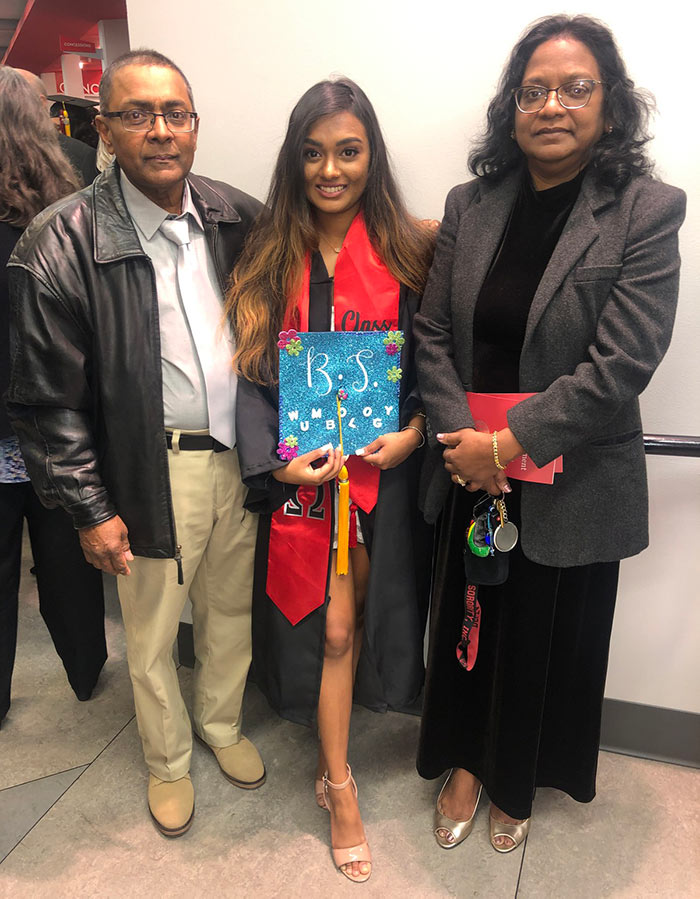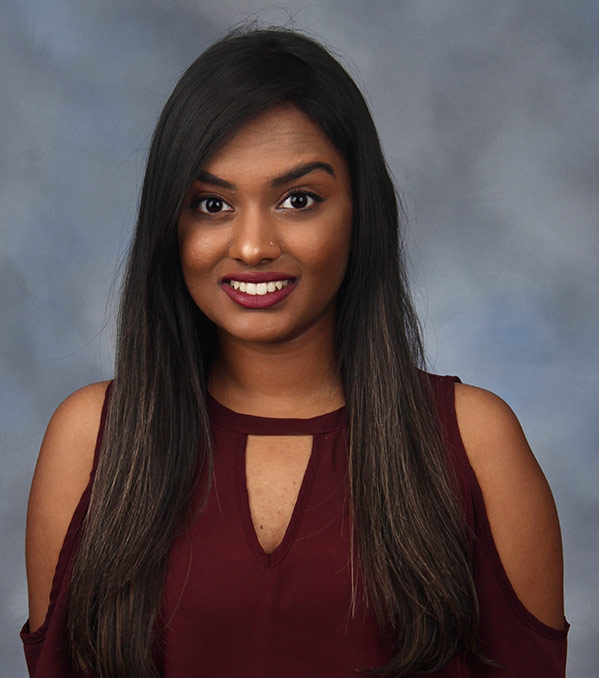Anasha Kawall, MS/Biomed '22
MS in Biomedical Sciences
September 15, 2022A first generation Indo-Guyanese American, Anasha Kawall MS/Biomed '22, grew up in
a family who values education. She said her Guyanese ancestors lacked educational
opportunities, as there were very few higher education institutions in the country.
Until the abolition of slavery in the British Empire, her family members worked on
sugarcane plantations as indentured servants.
In the 90's, Kawall's parents emigrated from Guyana to Tucker, Georgia, where she
and her siblings attended schools in Gwinnett's Meadowcreek cluster. When it came
time to enter high school, Kawall was eligible to attend Gwinnett's first STEM charter
school, Gwinnett School of Mathematics, Science and Technology, a top-ranked school
in both the state and the nation. Kawall was accepted following a lottery process.
She believes her high school education “constructed a solid foundation of biomedical
concepts to kick start my desire to become a pediatrician.”
At GSMST, she soon realized that some of her peers were from more affluent communities
of Gwinnett, while the majority of the student population in her cluster relied on
the National School Lunch Program. She said she went from having classmates whose
parents worked blue-collar jobs to having peers with parents who were CEOs, attorneys
and physicians.
While in high school, Kawall worked to explore the education gap in Gwinnett by tutoring
in various Gwinnett communities through the Gwinnett Environmental and Heritage Center,
Kumon, which offers after school math and reading programs, and the Center for Pan
Asian Community Services. In college, she went a step further by providing tutoring
services and raising awareness of educational equity in underserved communities in
Atlanta and Athens.
During her growing up years, Kawall's parents worked late shifts so her grandmother
cared for her and her brother and sister. Kawall recalls that her grandmother struggled
with diabetes so she relied on her nine-year-old granddaughter to administer her nightly
insulin injections. When Kawall was 13-years-old, her grandmother suffered a stroke
which raised many questions in the young girl's mind. Her high school science classes
eventually answered many of these questions.
Kawall is inspired by her father who she says “always worked hard to ensure that my
siblings and I were never short of resources to pursue our education.” She added,
“My father had big dreams, however he put his dreams on hold to ensure we could pursue
ours, which is a big sacrifice.” Eventually, he opened his own emissions shop in Norcross,
which allowed him to further support his children’s education.
In the fall of 2019, Kawall graduated from the University of Georgia with a BS in
Biology with plans to take her MCAT that winter, however the COVID pandemic derailed
her plans as her testing day was cancelled. Kawall said she knew she wanted to be
engaged in STEM education instead of waiting for the end of the pandemic.
“The pandemic was out of my control, but how I spent my time during lockdown was in
my control which led me to apply for the PCOM Biomedical Sciences program,” Kawall said. PCOM Georgia's Opportunities Academy, a STEM summer camp for high school students caught her eye. “I was thrilled to see
PCOM was working with Meadowcreek High School students to bridge the STEM education
gap in Gwinnett, an opportunity I wish I'd had growing up,” she said.
Graduating from PCOM Georgia's Biomedical Sciences program “is a decision I will never
regret as the program expanded my knowledge in biomedical concepts at a graduate level,
built a foundation to prepare me for medical school, and introduced me to research
opportunities with the School of Pharmacy on SARS-CoV-2,” she said.
Through the program, Kawall said she garnered “a stronger understanding of biomedical
concepts that shadow a first-year course sequence of medical school, such as neuroscience,
embryology, anatomy and physiology.” Alongside the courses, she pursued a Research-Thesis
concentration.
Her area of study involved high throughput screening of phytochemicals' antiviral
activity against the viral proteases responsible for the pandemic. Along with faculty members, she had the opportunity to present her findings at conferences such as the American
Chemical Society and the American Association of Colleges of Pharmacy, along with
PCOM's Research Day. She then completed an oral and written thesis defense, which
her father attended via Zoom, not understanding how to turn off his camera and microphone.
Her biggest fan kept appearing while she was presenting, Kawall said, which the audience
thought was “both humorous and adorable.”
In the future, Kawall aspires to attend a medical school with strong values in diversity,
equity and inclusion. She wants to serve underserved communities to “bridge the gap
in healthcare disparities and increase accessible and more affordable therapeutics
to those in need.” She plans to become a pediatrician to mentor children who are STEM
career driven and “reduce the financial hardship placed on working-class families
to create a healthier and more sustainable living for their children.”
She said, “I hope to reduce the notion that only the affluent can have a healthy lifestyle
and introduce healthier living in low-income and diverse communities.”
Kawall currently works as a clinical research coordinator at Children's Healthcare
of Atlanta and Emory School of Medicine. She oversees studies involving sickle cell
disease, Shiga-Toxin infections, headaches, seizures, wheezing and COVID-19 under
the Pediatric Emergency Care Applied Research Network. The network's purpose is to
pursue multi-institutional research on the preventative measures of acute illnesses
and injuries in pediatrics.
Day to day, Kawall recruits and educates patients and their guardians on qualified
studies, reviews protocols and organizes data for clinical trials – all very appropriate
responsibilities as she continues to pursue a path toward medical school.

 A first generation Indo-Guyanese American, Anasha Kawall MS/Biomed '22, grew up in
a family who values education. She said her Guyanese ancestors lacked educational
opportunities, as there were very few higher education institutions in the country.
Until the abolition of slavery in the British Empire, her family members worked on
sugarcane plantations as indentured servants.
A first generation Indo-Guyanese American, Anasha Kawall MS/Biomed '22, grew up in
a family who values education. She said her Guyanese ancestors lacked educational
opportunities, as there were very few higher education institutions in the country.
Until the abolition of slavery in the British Empire, her family members worked on
sugarcane plantations as indentured servants. In the future, Kawall aspires to attend a medical school with strong values in diversity,
equity and inclusion. She wants to serve underserved communities to “bridge the gap
in healthcare disparities and increase accessible and more affordable therapeutics
to those in need.” She plans to become a pediatrician to mentor children who are STEM
career driven and “reduce the financial hardship placed on working-class families
to create a healthier and more sustainable living for their children.”
In the future, Kawall aspires to attend a medical school with strong values in diversity,
equity and inclusion. She wants to serve underserved communities to “bridge the gap
in healthcare disparities and increase accessible and more affordable therapeutics
to those in need.” She plans to become a pediatrician to mentor children who are STEM
career driven and “reduce the financial hardship placed on working-class families
to create a healthier and more sustainable living for their children.”